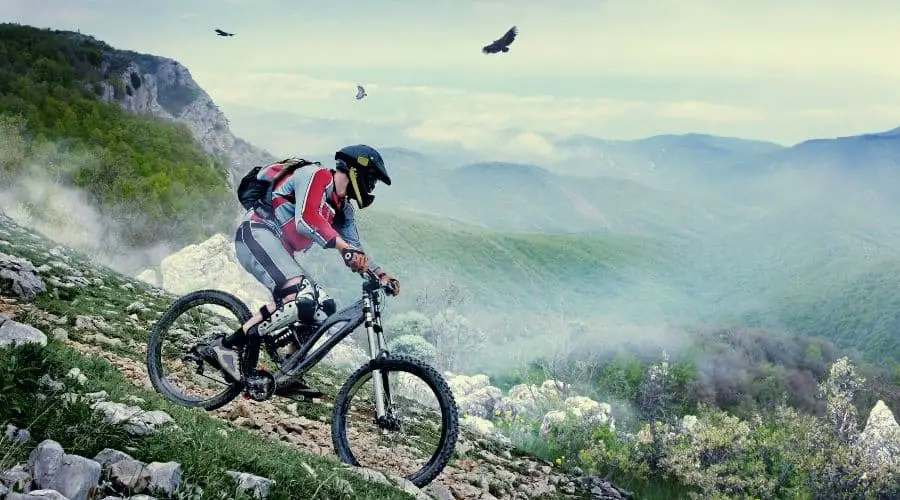Mountain biking is a serious discipline that requires a lot of effort and training to do well. Most riders only suffer injuries when they overdo it or lose focus and crash, but that doesn’t mean this is an easy sport to learn.
Picking up the basic ideas is easy but building genuine skills as an accomplished MTB rider can take years. Is mountain biking hard?
Mountain biking is hard and can be physically challenging, especially when you just start out or you push yourself beyond your riding limits and your muscles aren’t conditioned yet. You have to develop a significant amount of skill and physical fitness to get where you’re going. You need excellent balance, good reflexes, a lot of determination, and practice to learn mountain biking.
Recommended Gear
To see all of my up-to-date recommendations for bikes and cycling gear, check out this resource that I made for you!
Table of Contents
Is Mountain Biking Hard To Learn
Mountain biking is not hard to learn. However, that does not mean it is easy to master.
Picking up the essential skills, in theory, is a far cry from putting them into practice, and you should anticipate spending the first 1-2 years working on muscle memory and mastery before you’re truly skilled at this hobby sport.
Ultimately learning how to be a mountain biker is about two things. First, you need the perseverance to get you through.
Like many new skills, you will reach plateaus that simply have to be endured as you work through them.
Secondly, you need patience.
Is Mountain Biking A Hard Sport
Mountain biking is a demanding sport. Although this particular activity comes with a lot of enjoyment and a powerful sense of accomplishment, it is no mean feat.
Not only do you need the perseverance and patience to learn, but it also requires a lot of skill and physical fitness.
Happily, these are all things you can work on along your journey, but you’ll have to commit if you want to be a great mountain biker.
Is Downhill Mountain Biking Hard
Downhill mountain biking is deceptive. There’s a sense that gravity is doing all the work at first glance, but the truth is a lot more nuanced.
It takes a lot of skill to become a downhill mountain bike rider. When it looks easy, that is only a result of how much time and effort the rides put into honing this adrenaline-filled test of your reflexes.
As I Love Bicycling explains, “It’s insufficient to say that downhill mountain biking is extreme. Bombing down a mountainside on a 12-inch-wide trail at 20-40 miles per hour, hurtling through rock formations, launching off drops, and flying around corners above hundred-foot-tall cliffs is inherently dangerous.”
Is Mountain Biking Harder Than Road
Mountain biking is harder than road biking in some ways. However, it’s more of a tradeoff than one over the other. Apples and oranges.
For example, MTB riders deal with more hazardous terrain and dirt, but road bike enthusiasts have to cope with traffic, potholes, garbage and debris, and other similar concerns.
Both mountain bikes and road bikes tackle hills, learning to work on inclines and declines.
While road bikes get a smoother ride, they also have much thinner, smoother wheels.
MTBs have a wide knobby tire with better stability and traction, but they also sometimes have to make jumps where a road bike typically would never leave the ground.
The seats are very different as well. A road bike has a thin, hard plastic saddle that is only made for resting your sits bones.
Meanwhile, the mountain bike has a nice, wider, padded seat. Moreover, a road bike keeps your body forward-leaning, in an aerodynamic position made for speed.
In contrast, a mountain bike is an upright ‘heads-up’ riding position that is easier on the back and shoulders, though it causes more friction.
Road bike riders generally ride for long stretches and then stop.
Alternately an MTB rider might need to get off their bike and walk for a while or navigate over an insurmountable object like a large diameter fallen tree while carrying their bike.
This leads to different shoes and clothing as well.
The road bike riders often favor specialized, hard-soled shoes that are not good for walking but won’t work for a mountain bike rider on a trail.
Likewise, road cyclists wear bike bibs with chamois to pad their groin area and a jersey top.
Still, a mountain bike rider is more likely to wear casual, durable clothing and may even opt for additional protective gear.
Is Mountain Biking Harder Than Hiking
It’s difficult to compare mountain biking and hiking fairly, but I would say mountain biking is more strenuous than hiking in general.
They are very different activities, though both require a good awareness of your surroundings, excellent stability, and the use of your whole body.
Hiking burns more calories than cycling on the easy, flatter parts, but cycling requires more exertion on the uphill and downhill portions.
Hiking can be intense, but it is always slower than mountain biking because wheels always cover more ground in the same amount of time.
You also usually spend more energy on focus when riding, but you get to enjoy the landscape when you hike.
Is Mountain Biking Harder Than Running
Mountain biking is not harder than running. For one thing, riding an MTB is easier on your body.
Your joints get a relatively low-impact cardio workout, and you have the advantage of a seat and shock absorbers.
Meanwhile, as a runner, you are the shock absorber, and your joints do the work of a fork and springs.
A good bicycle helps you convert your muscle power into wheel action, which quickly covers ground.
No matter how fast you run, even Usain Bolt can’t match the speeds, especially downhill.
Over the same distance and terrain, your body will work much harder running than it would on a bicycle.
Is Mountain Biking Hard On Your Body
Mountain biking is hard on your body in some ways. It is easy to push too hard and end up with injuries related to overuse, like strained muscles.
However, it is also hard on your body in many of the right ways, which is to say it has many health benefits.
Your heart, lungs, leg muscles, circulatory system, and more will benefit from participating in this sport.
As is the case with all physical activities, it’s best to start slow and build up your skill and endurance over time.
ACSM’s Health and Fitness Journal reminds us, “The varying terrain allows for a full-body workout… Like all forms of biking, it induces a lower impact on the skeletal system than most activities — at least for the lower limbs. Also, because of the ever-changing terrain and grade, mountain bike rides can improve coordination and proprioception and challenge decision-making skills.”
Is Mountain Biking Hard On Your Back
Mountain biking is not especially hard on your back. The upright seating position is much more comfortable for most riders than road bike positions that have you leaned much further forward.
However, if you are having back pain when you take your MTB out, there are a couple of simple things you should check.
- Ensure your saddle is set to the proper height. Your leg should be almost fully extended when sitting with your entire body weight on the seat and your pedal as far from your body as it will reach.
- Crank length can also be to blame. If your leg cannot extend far enough with the seat set to maximum, you might need longer cranks.
- Similarly, it would be best always to make sure the overall frame size on your bike is correct for your height.
- Finally, check the rise of your handlebars. Too low, and you will overextend your reach, but too high will leave you feeling a little cramped.
Is Mountain Biking Hard On Your Knees
Biking of any kind, including MTB, is a lower impact activity for knees than running, walking, or hiking.
However, mountain biking can be rough on your knees. Around 20-60% of riders complain of knee pain.
The most common type of injury comes from overuse. The simplest solution is to work your way up slowly, building muscle and endurance, and always stop if you feel unusual pain.
Is Mountain Biking Hard On Joints
Mountain biking, when done correctly, is not especially hard on your joints. A properly adjusted bike makes a world of difference and can reduce strain on your shoulders, hips, ankles, and knees.
Moreover, biking is one of the more accessible activities for people who want a full-body workout with a low impact on the joints.
A good rule of thumb is to go easy. Only ride about half as far as you want to.
The difficulty for MTB riders is more about knowing when to stop because the endorphins and adrenaline that flood your system tend to overshadow and drown out any pain sensations.
Is Mountain Biking Hard On Shoulders
Mountain biking should not be hard on your shoulders. A correctly adjusted set of handlebars helps a lot.
However, the most common injury MTB riders encounter is the clavicle fracture, also known as a broken collar bone.
This injury doesn’t come from riding, though. Instead, mountain bike riders tend to break bones when they crash and flip over their handlebars.
Accidents happen but learning how to crash safely and roll when you land will help you avoid the worst injuries.
Helpful Tips To Know About If Mountain Biking Is Hard
There’s nothing easy about mountain biking, but when you have to work for it, the reward is all the sweeter.
If you want a simple, low-energy hobby, take up stamp collection or bird watching because MTBs are a wild ride.
Here are more helpful tips to know about if mountain biking is hard.
- Mountain biking is not a single activity, but rather five distinct disciplines. These are; All-Mountain which s also known as Enduro, Cross Country, Downhill, Freeride, and Trail Riding.
- The trade-off for all your hard work learning to mountain bike is extensive. Not only will you gain muscle and cardiovascular health, but it can also improve your mental health as well. Moreover, the reward chemicals like adrenaline and endorphins flow pretty freely when you are on a good ride. In short, there’s a big payoff for all that hard work.
- You need more than basic skills to be an MTB master. Core strength, muscle endurance, bike handling skills, and a lot of daring are just the beginning. Furthermore, you must have a sense of self-reliance, fast reflexes, and excellent balance. These are just the basics, the minimum to become competent. Mountain biking isn’t for everyone, but those who do it wouldn’t have it any other way.
Final Thoughts
Mountain biking is hard, or more accurately it is challenging and rewarding in equal measure. If you want to get fit and stay that way, this is the sport for you.
However, drive and patience will only get you part of the way there. You will have to work for years to master the skills involved in MTB riding.
Although the concepts are simple, the muscle memory, reflexes, and perseverance are not so easy.
However, if you stick to it and push past the tough parts, you will find there’s nothing as exhilarating as a great ride. The difficulty is what makes mountain biking worthwhile.

